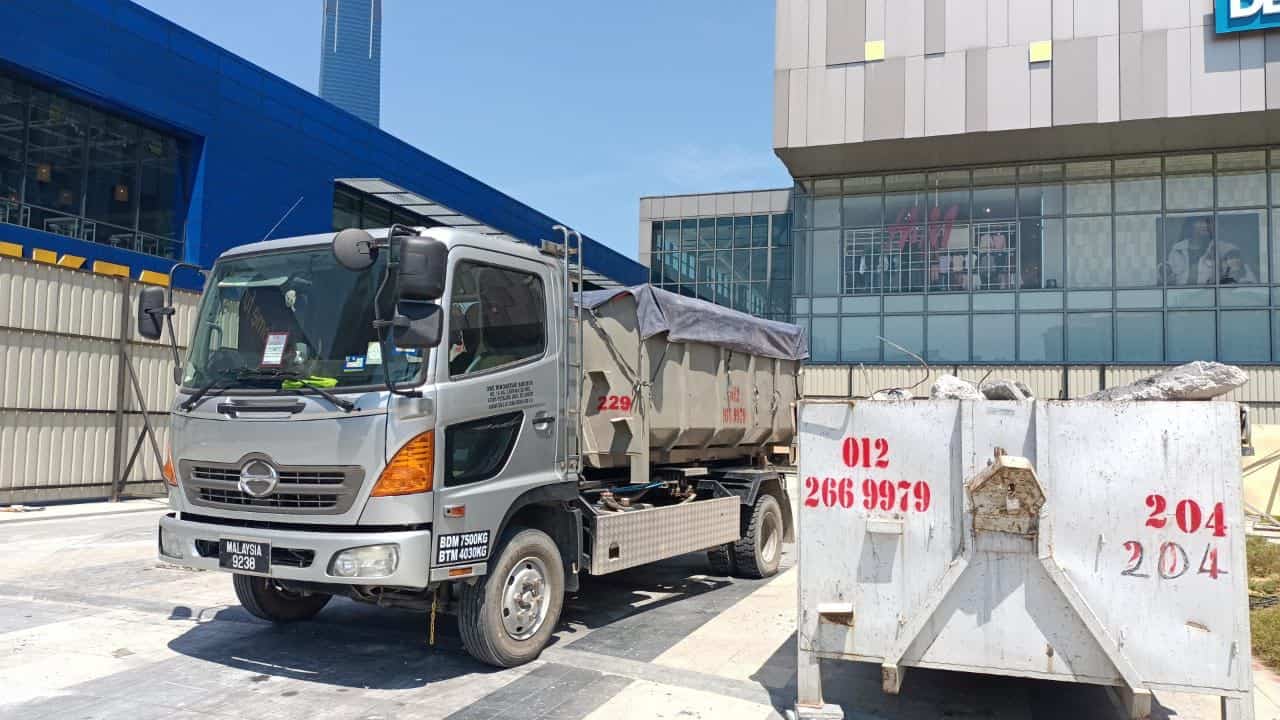RORO BIN RENTAL
Find The Right Size For Your Project

Small Roro Bin
Dimensions: 12′ (L) X 6′ (W) X 2.5′ (H)
Best Use: Heavy construction and demolition waste like concrete and soil.

Large Roro Bin
Dimensions: 12′ (L) X 6′ (W) X 4′ (H)
Best Use: Light-weight construction, industrial, commercial waste, furniture, household bulky waste, trees and etc.

Domestic Roro Bin
Dimensions: 12′ (L) X 6′ (W) X 4′ (H) with roof
Best Use: Domestic food waste (Organic waste).

Extra Giant Roro Bin
Dimensions: 16′ (L) X 8′ (W) X 6′ (H)
Best Use: Light-weight construction, industrial, commercial waste, furniture, household bulky waste, trees and etc.

Giant Roro Bin
Dimensions: 14′ (L) X 7′ (W) X 5.5′ (H)
Best Use: Light-weight construction, industrial, commercial waste, furniture, household bulky waste, trees and etc.
WHAT MAKES US DIFFERENT ?

Value Price

Express Service

Licensed Under Local Authorities

Quick Scheduling
TESTIMONIALS
OUR CLIENTS







PROJECT REFERENCE









Waste Management Companies
Waste management companies are the unsung heroes that play a crucial role in maintaining a clean and sustainable environment. They help manage, collect, recycle, and dispose of waste materials, making sure that everything from household trash to industrial waste is handled properly. We will dive into the world of waste management companies, explaining their importance, the services they offer, and why they are essential to our communities and the planet.
What is Waste Management?
Waste management refers to the collection, transportation, processing, and disposal of waste materials. These materials could be anything from household garbage to industrial by-products. The process aims to minimize the environmental impact of waste, prevent pollution, and promote sustainability.
The Role of a Waste Management Company
A waste management company serves as the middleman between waste producers (residential, commercial, or industrial) and the environment. They ensure that waste is properly sorted, processed, and disposed of, often by recycling, incineration, or sending it to landfills. These companies are vital in helping cities and businesses reduce their carbon footprint and comply with environmental regulations.
Why Waste Management Matters in Today’s World
Waste management is more than just garbage collection. With the increasing global population, urbanization, and consumerism, waste production is at an all-time high. Proper waste management is crucial to ensure that waste doesn’t pile up, pollute the environment, or harm wildlife. It’s also essential for promoting sustainable living, conserving natural resources, and reducing the strain on landfills.
Types of Waste Managed by Waste Management Companies
Waste management companies handle a wide variety of waste materials, and understanding the different types of waste they manage helps highlight the complexity of their work.
Solid Waste
Solid waste is the most common type of waste that waste management companies deal with. It includes everyday items like food wrappers, plastic bottles, and furniture. This type of waste is usually disposed of through landfills, recycling, or incineration.
Hazardous Waste
Hazardous waste is dangerous to both human health and the environment. It includes materials like chemicals, batteries, pesticides, and medical waste. Handling hazardous waste requires special care, and waste management companies must adhere to strict guidelines to ensure safe disposal.
Electronic Waste (E-Waste)
E-waste consists of discarded electronic devices such as old computers, mobile phones, and televisions. This type of waste is rapidly increasing as technology advances, and recycling e-waste is crucial to recover valuable materials like metals and reduce toxic exposure.
Liquid Waste
Liquid waste includes substances like sewage, wastewater from industrial processes, and oils. Waste management companies have special systems for managing and treating liquid waste to prevent contamination of water sources and public health risks.
Services Provided by Waste Management Companies
Waste management companies provide a range of services aimed at managing waste responsibly and efficiently.
Waste Collection
Waste collection is the most basic service offered by these companies. This involves picking up waste from homes, businesses, or industrial sites. Companies often use specialized vehicles to transport waste to sorting and recycling facilities.
Waste Sorting and Recycling
Many waste management companies offer sorting services, where waste is divided into recyclable and non-recyclable materials. They then process these materials for reuse, which helps reduce the amount of waste sent to landfills and conserves natural resources.
Waste Disposal
Not all waste can be recycled. For the waste that cannot be reused, waste management companies must find safe ways to dispose of it. Common disposal methods include sending waste to landfills or incinerators, both of which are designed to minimize environmental harm.
Environmental Impact Services
Some waste management companies also provide services that help businesses and municipalities assess their environmental impact, develop waste reduction strategies, and comply with local environmental regulations.
How Waste Management Companies Operate
Waste management companies operate in complex and highly regulated environments. Here’s an overview of how they carry out their operations.
Collection and Transportation Process
The waste management process begins with the collection of waste from homes, businesses, and industrial facilities. Specialized trucks are used to transport the waste to designated processing or disposal sites. The collection process can vary depending on the type of waste being managed.
Waste Sorting and Recycling Process
Once the waste is collected, it’s transported to sorting facilities. Here, the waste is separated into different categories—recyclables, non-recyclables, and hazardous materials. Recyclables are sent to recycling centers, while non-recyclable waste is either sent to landfills or incinerators.
Disposal Methods: Landfill vs. Incineration
Waste management companies often have to choose between two main disposal methods—landfills and incineration. Landfills involve burying waste in large, controlled areas, while incineration involves burning waste at high temperatures. Both methods have their pros and cons, with incineration being more environmentally friendly but more expensive.
Technologies Used in Waste Management
Technology plays a major role in improving the efficiency and sustainability of waste management.
Waste to Energy (WTE) Technologies
Waste-to-energy technologies convert non-recyclable waste materials into electricity, heat, or fuel. These technologies help reduce the amount of waste going to landfills while providing a source of renewable energy.
Automation and Smart Waste Management
With the advent of smart sensors and automation, waste management companies are improving efficiency. Automated waste sorting systems, smart bins that track waste levels, and even drones are being used to streamline waste collection and sorting processes.
Data Analytics and Waste Tracking
Companies are increasingly using data analytics to track waste management processes, monitor performance, and predict future waste production. This helps improve efficiency and enables waste management companies to offer more sustainable solutions.
The Importance of Sustainable Waste Management
Sustainable waste management is more important than ever as we face environmental challenges like climate change and resource depletion.
Reducing Landfill Overflow
Landfills are reaching capacity in many parts of the world, and we are running out of space to dispose of waste. Sustainable waste management practices, such as recycling and composting, help reduce the amount of waste sent to landfills.
Environmental Benefits: Reducing Carbon Footprint
By recycling materials like metals, plastics, and paper, waste management companies help reduce the energy consumption required to create new products, ultimately lowering greenhouse gas emissions and our carbon footprint.
Promoting Recycling and Reuse
Recycling helps reduce the need for raw materials, conserving natural resources and reducing the environmental impact of mining and manufacturing. Waste management companies play a vital role in promoting recycling and the reuse of materials.
Challenges Faced by Waste Management Companies
Despite the essential services they provide, waste management companies face several challenges that make their operations difficult.
High Operational Costs
Waste management companies often face high operational costs, from transportation to sorting technology. Additionally, compliance with environmental regulations can increase costs, making it challenging for companies to maintain profit margins.
Public Awareness and Education
One of the biggest challenges for waste management companies is educating the public about proper waste disposal and recycling practices. Many people are unaware of how to properly separate their waste or recycle, which leads to inefficiency.
Legal and Regulatory Compliance
Waste management is highly regulated. Companies must adhere to various local, state, and federal regulations regarding waste disposal, hazardous materials, and environmental protection. Staying compliant with these rules can be time-consuming and costly.
Benefits of Partnering with a Waste Management Company
Partnering with a waste management company comes with many benefits for both individuals and businesses.
Cost Efficiency for Businesses
By outsourcing waste management to professionals, businesses can save money on operational costs and reduce the need for in-house waste management systems.
Sustainability for the Environment
Working with a waste management company ensures that waste is handled in an environmentally responsible way. Many companies prioritize recycling, reducing landfill waste, and lowering carbon emissions.
Compliance with Local Laws and Regulations
Waste management companies help businesses comply with local waste disposal regulations, which is crucial for avoiding fines and legal trouble.
Waste Management in the Future
The future of waste management looks bright with new technologies and approaches on the horizon.
Trends in Waste Management: Circular Economy
The circular economy model encourages the recycling and reuse of materials, minimizing waste and maximizing the lifecycle of products. Waste management companies are increasingly adopting circular economy principles to create more sustainable systems.
Emerging Technologies and Innovations
Emerging technologies like AI-driven waste sorting systems and biodegradable plastics are revolutionizing waste management. These innovations will make the industry more efficient and environmentally friendly.
Role of Waste Management Companies in Climate Change Mitigation
Waste management companies play a key role in mitigating climate change by reducing emissions from landfills, promoting recycling, and harnessing waste-to-energy technologies. Their efforts will be crucial in achieving global sustainability goals.
Waste management companies are critical to the health of our environment and communities. By offering a wide range of services, from waste collection and recycling to waste-to-energy solutions, these companies help manage the growing problem of waste. As we continue to face environmental challenges, sustainable waste management will become even more important. The future of waste management looks bright, with new technologies and practices emerging to make the industry more efficient and eco-friendly.


